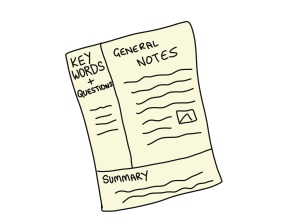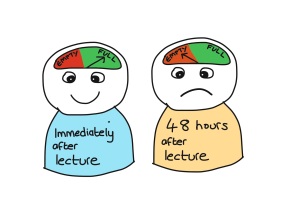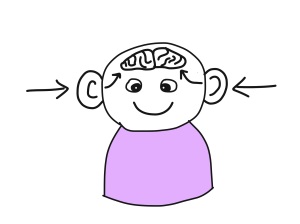You can’t do all of these things, but we would definitely recommend number 2 if you do nothing else!!
You can’t do all of these things but we would definitely recommend number 2 if you do nothing else!!
- Use the Cornell note taking method.
 This is a brilliant way to take notes as it highlights key points, reminds you to check up on things you didn’t understand – and gets you to summarise things which helps you when you are revising later (see 2.)
This is a brilliant way to take notes as it highlights key points, reminds you to check up on things you didn’t understand – and gets you to summarise things which helps you when you are revising later (see 2.)
Divide all your pages as shown and use for general notes, key words and questions and a summary of the page. This is easy to do if you are taking notes on a laptop or tablet too! - Go over notes after 1-2 days.
 A classic piece of psychological research shows that you forget 80% of what you learn if you don’t look at it again within 24-48 hours (Ebbinhaus, 1913). This means that when it comes to revision you can’t remember ANYTHING. It may as well be called ‘vision’ not revision! If you categorise them, draw a mind map, highlight important points, blog about them – basically anything that involves thinking about them you are so much more likely to remember them later. If you use the Cornell method above, you can fill the summarise section a day or two later you will be laughing when exams come along and it is easier to revise from too. Win Win.
A classic piece of psychological research shows that you forget 80% of what you learn if you don’t look at it again within 24-48 hours (Ebbinhaus, 1913). This means that when it comes to revision you can’t remember ANYTHING. It may as well be called ‘vision’ not revision! If you categorise them, draw a mind map, highlight important points, blog about them – basically anything that involves thinking about them you are so much more likely to remember them later. If you use the Cornell method above, you can fill the summarise section a day or two later you will be laughing when exams come along and it is easier to revise from too. Win Win. - Use EverNote (other note taking apps are available).
 We have people in the library who would rather lose an arm than lose their EverNote app! Seriously!! This is a great free app that you can use for organising your notes, it syncs with your calendar and automatically records the name and time of any session that you create a note during. You can also add images and audio – it is incredibly versitile. If you need to upgrade to get more memory (needed if you are recording audio) then it only costs $5 (about £3:25) a month. Bargain!
We have people in the library who would rather lose an arm than lose their EverNote app! Seriously!! This is a great free app that you can use for organising your notes, it syncs with your calendar and automatically records the name and time of any session that you create a note during. You can also add images and audio – it is incredibly versitile. If you need to upgrade to get more memory (needed if you are recording audio) then it only costs $5 (about £3:25) a month. Bargain! - Record them using a dedicated app. There are several apps for recording lectures and making simultaneous notes (which are then synced). You can go over your notes and playback the appropriate part of the lecture if you want to hear it again. Check out LectureMonkey or Super Notes. Don’t try to transcribe whole lecture though it would be a waste of time. It is polite to ask your lecturer if it is OK to record them too. The only disadvantage is you have to sit near the front!!
- Listen and understand!
 This is actually more important than taking masses of notes. Lectures are a gateway into the topic and you are going to do lots of reading around it anyway. Most important is to understand it first time or at least work out what you don’t understand to ask about in seminars, tutorials etc.
This is actually more important than taking masses of notes. Lectures are a gateway into the topic and you are going to do lots of reading around it anyway. Most important is to understand it first time or at least work out what you don’t understand to ask about in seminars, tutorials etc.
Ebbinghaus, H. (2013) Memory: A contribution to experimental psychology. Annals of Neurosciences, 20(4), 155.
Ebbinghaus, H. (2013) Memory: A contribution to experimental psychology. Annals of Neurosciences, 20(4), 155.
